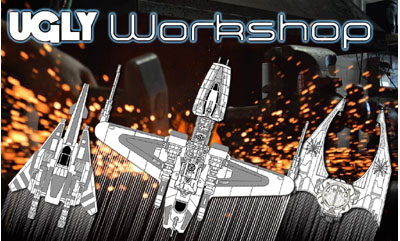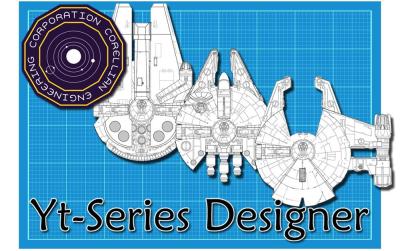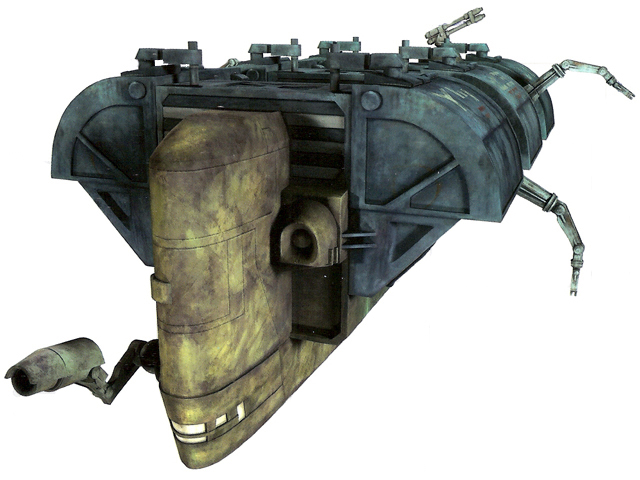Long Reach Transport
One of Sienar's first successful military transports, the TID-12/a "Long
Reach" served the Republic fleet with the utmost efficiency for many years
and even saw extended usage by the early Imperial Navy and then the Rebel
Alliance.
Driven by three advanced Sienar Design Systems' h-ID mark II ion drives,
the vessel could cruise at speeds far exceeding the average for its class -
most transport vessels of its size were at least twenty percent slower at
cruising speeds.
Equipped with a Class Three hyperdrive, the Long Reach soon became one
of the Republic's most commonly used long-range transports. This,
combined with its modular design, gave the Long Reach the ability to
easily ferry troops, equipment, supplies and even ground vehicles from
planet-to-planet, ship-to-ship and most frequently, ship-to-surface.
The Long Reach's only design flaw was its inability to rapidly arrive at
a planetary surface. Sienar never originally intended the craft to serve
as a dropship or the vessel would have been designed accordingly, it was
simply intended to ferry replacement troops, supplies and vehicles to
secure landing zones, not the intense combat arenas in which the Republic
was so eager to send it into.
Entering combat zones usually meant dealing with at least limited amounts
of anti-air fire concentrated upon landing craft - if you can eliminate a
landing craft on the way down then you essentially eliminate all of the
troops and vehicles on board. The first wave of Long Reach transports saw
heavy casualities during such operations as it presented quite a target
profile. Instead of spending countless sums of credits to replace this new
vessel, the Republic began installing more powerful shield generators to
increase the protection to the ship's ventral surface where the majority
of the anti-air fire hit. This modification was a huge success.
Armed with only a double blaster cannon mounted on a turret upon the ship's
"chin," the Long Reach depended highly upon two things: safety in numbers
and escorts (usually consisting of Republic Z-95 Headhunters).
The Republic sometimes opted to mount a pair of short-range starfighters
(the original Mark I Z-95s) on external starfighter racks, similar to those
found on the Carrack light cruiser. Planetary landings for these vessels
required that the fighters be launched and the racks retracted. The pair
of fighters could then intercept any enemy fighters and offer adequate air
support for disembarking troops.
Ingress/egress hatches on either side of the vessels allowed for rapid
loading and unloading of troops, vehicles and cargo while the chin turret
provided a sufficient amount of supressing cover fire.
The Empire did not waste much time in finding a more "modern" replacement
for the Long Reach. Actually, the Empire replaced it with several different
craft including the Sentinel landing craft (which was referred to as the
"Baby Long Reach" when it was first developed) and Kuat Drive Yards'
Warhammer AT-AT transport. However, the Rebel Alliance made good use
of the handful of Long Reaches it was able to get its hands on.
Craft: Sienar Design Systems' TID-12/a "Long Reach"
Class: Space Transport
Size: Large (112 m long)
Hyperdrive: x3
Passangers: 40 to 1,000 (depending upon configuration)
Cargo Capacity: 50 to 42,000 tons (depending upon configuration)
Consumables: 1 month
Cost: Not available for sale (160,000 credits used during the Classic Era)
Maximum Speed In Space: Attack (8 squares/action)
Atmospheric Speed: 850 km/h (13 squares/action)
Crew: 5 (Normal +2)
Initiative: +1 (-1 size, +2 crew)
Maneuver: +1 (-1 size, +2 crew)
Defense: 19 (-1 size, +10 armor)
Shield Points: 45 (DR 10)
Hull Points: 120 (DR 10)
Weapons:
Double Blaster Cannon
Fire Arc: Chin turret
Attack Bonus: +1 (-1 size, +2 fire control)
Damage: 4d10x2
Range Modifiers: PB/S +0, M/L n/a
Starships:
Can be equipped with up to two external starfighter racks.
Ground Vehicles:
Up to 24 repulsortanks or vehicles of equivilant size or 40 AT-PTs.
Carrying vehicles reduces cargo and passenger capacity, if vehicle
capacity is 50% then reduce maximum cargo and passenger capacities
by 50% to reflect this. If vehicle capacity is 100%, then passenger
and cargo capacity is at minimum levels indicated above.
|











